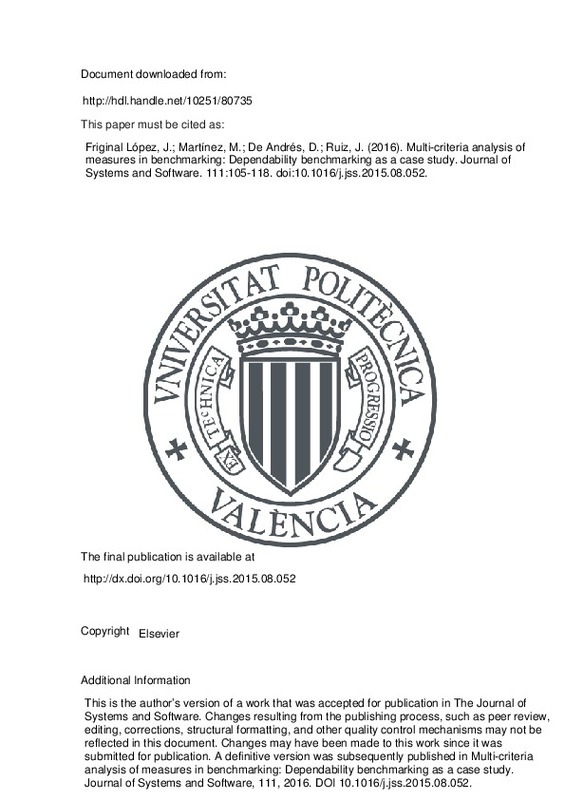JavaScript is disabled for your browser. Some features of this site may not work without it.
Buscar en RiuNet
Listar
Mi cuenta
Estadísticas
Ayuda RiuNet
Admin. UPV
Multi-criteria analysis of measures in benchmarking: Dependability benchmarking as a case study
Mostrar el registro sencillo del ítem
Ficheros en el ítem
| dc.contributor.author | Friginal López, Jesús
|
es_ES |
| dc.contributor.author | Martínez, Miquel
|
es_ES |
| dc.contributor.author | De Andrés, David
|
es_ES |
| dc.contributor.author | Ruiz, Juan-Carlos
|
es_ES |
| dc.date.accessioned | 2017-05-08T11:42:38Z | |
| dc.date.available | 2017-05-08T11:42:38Z | |
| dc.date.issued | 2016-01 | |
| dc.identifier.issn | 0164-1212 | |
| dc.identifier.uri | http://hdl.handle.net/10251/80735 | |
| dc.description | This is the author’s version of a work that was accepted for publication in The Journal of Systems and Software. Changes resulting from the publishing process, such as peer review, editing, corrections, structural formatting, and other quality control mechanisms may not be reflected in this document. Changes may have been made to this work since it was submitted for publication. A definitive version was subsequently published in Multi-criteria analysis of measures in benchmarking: Dependability benchmarking as a case study. Journal of Systems and Software, 111, 2016. DOI 10.1016/j.jss.2015.08.052. | es_ES |
| dc.description.abstract | Benchmarks enable the comparison of computer-based systems attending to a variable set of criteria, such as dependability, security, performance, cost and/or power consumption. It is not despite its difficulty, but rather its mathematical accuracy that multi-criteria analysis of results remains today a subjective process rarely addressed in an explicit way in existing benchmarks. It is thus not surprising that industrial benchmarks only rely on the use of a reduced set of easy-to-understand measures, specially when considering complex systems. This is a way to keep the process of result interpretation straightforward, unambiguous and accurate. However, it limits at the same time the richness and depth of the analysis process. As a result, the academia prefers to characterize complex systems with a wider set of measures. Marrying the requirements of industry and academia in a single proposal remains a challenge today. This paper addresses this question by reducing the uncertainty of the analysis process using quality (score-based) models. At measure definition time, these models make explicit (i) which are the requirements imposed to each type of measure, that may vary from one context of use to another, and (ii) which is the type, and intensity, of the relation between considered measures. At measure analysis time, they provide a consistent, straightforward and unambiguous method to interpret resulting measures. The methodology and its practical use are illustrated through three different case studies from the dependability benchmarking domain, a domain where various different criteria, including both performance and dependability, are typically considered during analysis of benchmark results.. Although the proposed approach is limited to dependability benchmarks in this document, its usefulness for any type of benchmark seems quite evident attending to the general formulation of the provided solution. © 2015 Elsevier Inc. All rights reserved. | es_ES |
| dc.description.sponsorship | This work is partially supported by the Spanish project ARENES (TIN2012-38308-C02-01), ANR French project AMORES (ANR-11-INSE-010), the Intel Doctoral Student Honour Programme 2012, and the "Programa de Ayudas de Investigacion y Desarrollo" (PAID) from the Universitat Politecnica de Valencia. | en_EN |
| dc.language | Inglés | es_ES |
| dc.publisher | Elsevier | es_ES |
| dc.relation.ispartof | Journal of Systems and Software | es_ES |
| dc.rights | Reserva de todos los derechos | es_ES |
| dc.subject | Multiple-Criteria Decision Making (MCDM) | es_ES |
| dc.subject | Dependability benchmarking | es_ES |
| dc.subject | Quality models | es_ES |
| dc.subject.classification | ARQUITECTURA Y TECNOLOGIA DE COMPUTADORES | es_ES |
| dc.title | Multi-criteria analysis of measures in benchmarking: Dependability benchmarking as a case study | es_ES |
| dc.type | Artículo | es_ES |
| dc.identifier.doi | 10.1016/j.jss.2015.08.052 | |
| dc.relation.projectID | info:eu-repo/grantAgreement/MINECO//TIN2012-38308-C02-01/ES/ADAPTIVE AND RESILIENT NETWORKED EMBEDDED SYSTEMS/ | es_ES |
| dc.relation.projectID | info:eu-repo/grantAgreement/ANR//ANR-11-INSE-0009/FR/Architecture for MObiquitous REsilient Systems/AMORES/ | es_ES |
| dc.rights.accessRights | Abierto | es_ES |
| dc.contributor.affiliation | Universitat Politècnica de València. Escola Tècnica Superior d'Enginyeria Informàtica | es_ES |
| dc.description.bibliographicCitation | Friginal López, J.; Martínez, M.; De Andrés, D.; Ruiz, J. (2016). Multi-criteria analysis of measures in benchmarking: Dependability benchmarking as a case study. Journal of Systems and Software. 111:105-118. https://doi.org/10.1016/j.jss.2015.08.052 | es_ES |
| dc.description.accrualMethod | S | es_ES |
| dc.relation.publisherversion | http://dx.doi.org/10.1016/j.jss.2015.08.052 | es_ES |
| dc.description.upvformatpinicio | 105 | es_ES |
| dc.description.upvformatpfin | 118 | es_ES |
| dc.type.version | info:eu-repo/semantics/publishedVersion | es_ES |
| dc.description.volume | 111 | es_ES |
| dc.relation.senia | 293887 | es_ES |
| dc.contributor.funder | Agence Nationale de la Recherche, Francia | es_ES |
| dc.contributor.funder | Ministerio de Economía y Competitividad | es_ES |
| dc.contributor.funder | Universitat Politècnica de València | es_ES |
| dc.contributor.funder | Intel Corporation | es_ES |







![[Cerrado]](/themes/UPV/images/candado.png)

